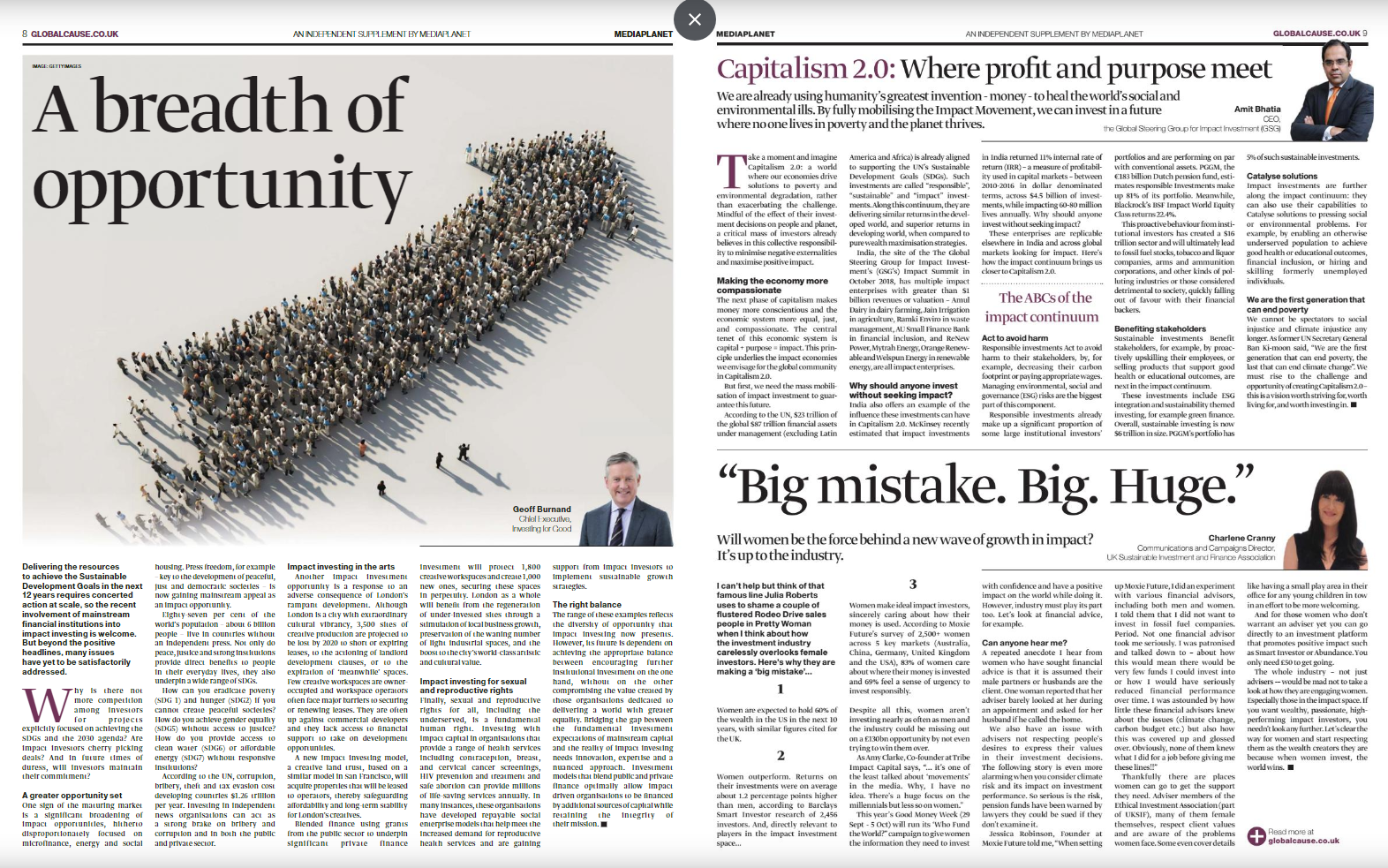Discover our article "Impact investing: a breadth of opportunity" published on Media Planet
The Pope Francis rarely makes headlines of financial newspapers. Media Planet dared to highlight the Catholic leader's vision of "putting the economy at the service of peoples", a vision shared by the social investment sector.
Investing for Good took part in the writing of "The Future of Impact Investing", a special edition of Media Planet published on Sept 28th 2018 as a supplement of The Guardian. Discover below the article "A breadth of opportunity" written by Geoff Burnand, CEO at Investing for Good.
To access the full publication, click here.
Impact Investing: a breadth of opportunity
Delivering the resources to achieve the Sustainable Development Goals in the next twelve 12 years requires concerted action at scale, so the recent involvement of mainstream financial institutions into impact investing is welcome. But beyond the positive headlines, many issues have yet to be satisfactorily addressed. Why is there not more competition among investors for projects explicitly focused on achieving the SDGs and the 2030 agenda? Are impact investors cherry picking deals? And in future times of duress, will investors maintain their commitment?
A greater opportunity set
One sign of the maturing market is a significant broadening of impact opportunities, hitherto disproportionately focused on microfinance, energy and social housing. Press freedom, for example – key to the development of peaceful, just and democratic societies – is now gaining mainstream appeal as an impact opportunity.
Eighty-seven per cent of the world’s population – about 6 billion people – live in countries without an independent press. Not only do peace, justice and strong institutions provide direct benefits to people in their everyday lives, they also underpin a wide range of SDGs.
How can you eradicate poverty (SDG 1) and hunger (SDG2) if you cannot create peaceful societies? How do you achieve gender equality (SDG5) without access to justice? How do you provide access to clean water (SDG6) or affordable energy (SDG7) without responsive institutions?
According to the UN, corruption, bribery, theft and tax evasion cost developing countries $1.26 trillion per year. Investing in independent news organisations can act as a strong brake on bribery and corruption and in both the public and private sector.
Impact investing in the arts
Another impact investment opportunity is a response to an adverse consequence of London’s rampant development. Although London is a city with extraordinary cultural vibrancy, 3,500 sites of creative production are projected to be lost by 2020 to short or expiring leases, to the actioning of landlord development clauses, or to the expiration of ‘meanwhile’ spaces. Few creative workspaces are owner-occupied and workspace operators often face major barriers to securing or renewing leases. They are often up against commercial developers and they lack access to financial support to take on development opportunities.
A new impact investing model, a creative land trust, based on a similar model in San Francisco, will acquire properties that will be leased to operators, thereby safeguarding affordability and long-term stability for London’s creatives.
Blended finance using grants from the public sector to underpin significant private finance investment will protect 1,800 creative workspaces and create 1,000 new ones, securing these spaces in perpetuity. London as a whole will benefit from the regeneration of under-invested sites through a stimulation of local business growth, preservation of the waning number of light industrial spaces, and the boost to the city’s world-class artistic and cultural value.
Impact investing for sexual and reproductive rights
Finally, sexual and reproductive rights for all, including the underserved, is a fundamental human right. Investing with impact capital in organisations that provide a range of health services including contraception, breast, and cervical cancer screenings, HIV prevention and treatment and safe abortion can provide millions of life-saving services annually. In many instances, these organisations have developed repayable social enterprise models that help meet the increased demand for reproductive health services and are gaining support from impact investors to implement sustainable growth strategies.
The right balance
The range of these examples reflects the diversity of opportunity that impact investing now presents. However, its future is dependent on achieving the appropriate balance between encouraging further institutional investment on the one hand, without on the other compromising the value created by those organisations dedicated to delivering a world with greater equality. Bridging the gap between the fundamental investment expectations of mainstream capital and the reality of impact investing needs innovation, expertise and a nuanced approach. Investment models that blend public and private finance optimally allow impact driven organisations to be financed by additional sources of capital while retaining the integrity of their mission.


